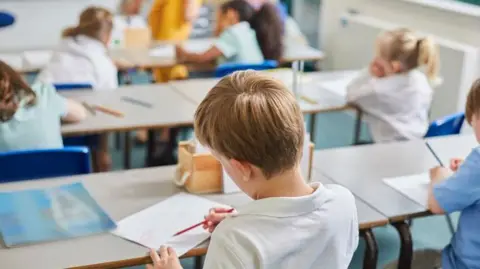Benefit cap punishing poor children, study says
 Getty
GettyA charity has said the two-child benefit cap is "punishing" poorer children, as new figures on child poverty rates in the UK were revealed.
Research by Loughborough University suggested 31% of children in north-east England were in relative poverty - in line with the UK average - but that rose to 52% in Middlesbrough and Thornaby East and 43% in Newcastle Central and West.
The North East Child Poverty Commission said government pledges to deliver ambitious plans to reduce child poverty must be be turned into real action.
The Department of Work and Pensions (DWP), which said it was "determined to bring down child poverty", is expected to announce its decision on the cap in autumn.
The two-child cap prevents most families claiming means-tested benefits for any third or additional children born after April 2017.
Researchers working on the study, commissioned by the End Child Poverty coalition, found child poverty rates across the UK were "directly and strongly correlated" with the percentage of children affected by the two-child limit in that local area.
The Loughborough study concluded: "While the benefit cap can affect all out-of-work households, the two-child limit specifically targets larger families.
"It is widely acknowledged that many households are living below the poverty line as a direct consequence of the policy, a high proportion of whom are already in work, with limited scope to increase their incomes.
"Research by Child Poverty Action Group indicates that removing the policy would lift 350,000 children out of poverty, while reducing the depth of poverty for a further 700,000 children, at a cost of £2 billion."
'Causing damage'
The research findings were localised based on parliamentary constituencies, with a number of North East areas, including Easington and Bishop Auckland, showing 33% of children in relative poverty.
Leigh Elliott, from Children North East, said these families were being "punished" by cap.
"We see the terrible, limiting impact of this every single day on the children and families we work with across the region," she said.
Meanwhile, Tracey Herrington from Thrive Teesside said: "Year on year, we bear witness to the rising numbers of children being pulled into poverty through no fault of their own.
"Policies – like the two-child limit – that are actively causing damage, hardship and even destitution."
The DWP did not directly address the two-child cap, but pointed to policies such as breakfast clubs, school uniform price limits and a raise to the minimum wage as policies to help the "poorest families".
A spokesperson said: "We are determined to bring down child poverty."
They said that later this year the government would publish plans to "deliver fully-funded measures that tackle the structural and root causes of child poverty across the country".
Last week, Education Secretary Bridget Phillipson said the government was looking into scrapping the cap, but warned it would "cost a lot of money".
It comes after the the government's child poverty strategy, which had been due for publication in the spring, was delayed.
